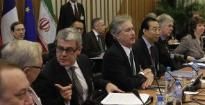Iran Invites EU to Tour Nuke Sites
Iran has invited Russia, China, the European Union and its allies among the Arab and developing world to tour its nuclear sites, in an apparent move to gain support ahead of a new round of talks with six world powers.
In a letter made available Monday to The Associated Press, senior Iranian envoy Ali Asghar Soltanieh suggests the weekend of Jan. 15 and 16 for the tour and says that meetings "with high ranking officials" are envisaged.
While no reason was given for the timing of the offer, it comes just weeks before Iran and the six powers follow up on recent talks that ended with agreement on little else but to meet again.
The new round between Tehran, and the permanent U.N. Security Council members - the U.S. Russia, China, Britain, France - plus Germany, is tentatively set for Istanbul, Turkey in late January.
It is meant to explore whether there is common ground for more substantive talks on Iran's nuclear program, viewed by the U.S, and its allies as a cover for secret plans to make nuclear arms - something Tehran denies.
Instead, the Islamic Republic insists its uranium enrichment and other programs are meant only for peaceful purposes to generate fuel for a future network of nuclear reactors.
Diplomats from delegations at the table with Iran during the December talks in Geneva said Tehran made no commitments to talking about U.N. Security Council demands that it freeze uranium enrichment - which can turn out both fuel and fissile warhead material. And Iranian negotiators flatly ruled out discussing such demands at the Istanbul meeting.
International worries are great because Tehran developed its enrichment program clandestinely and because it refuses to cooperate with the U.N.'s International Atomic Energy Agency probe meant to follow up on suspicions that it experimented with components of a nuclear weapons program. Tehran denies such work.
The offer of a visit comes more than three years after six diplomats from developing nations accredited to the IAEA visited Iran's uranium ore conversion site at Isfahan, which turns raw uranium into the gas that is then fed into enriching centrifuges. Participating diplomats then told reporters they could not make an assessment of Iran's nuclear aims based on what they saw at that facility in central Iran.
But the new offer appeared more wide ranging, both as far as the nations or groups invited and sites to be visited.


